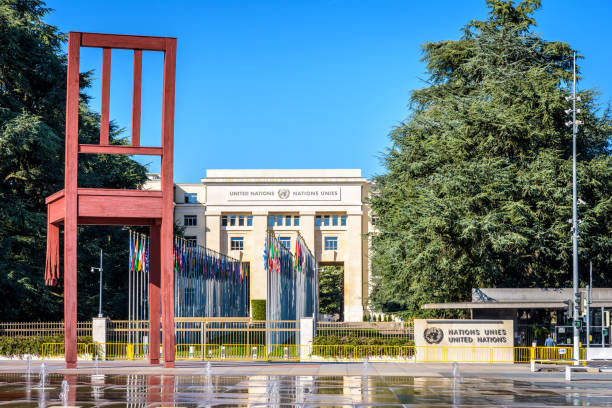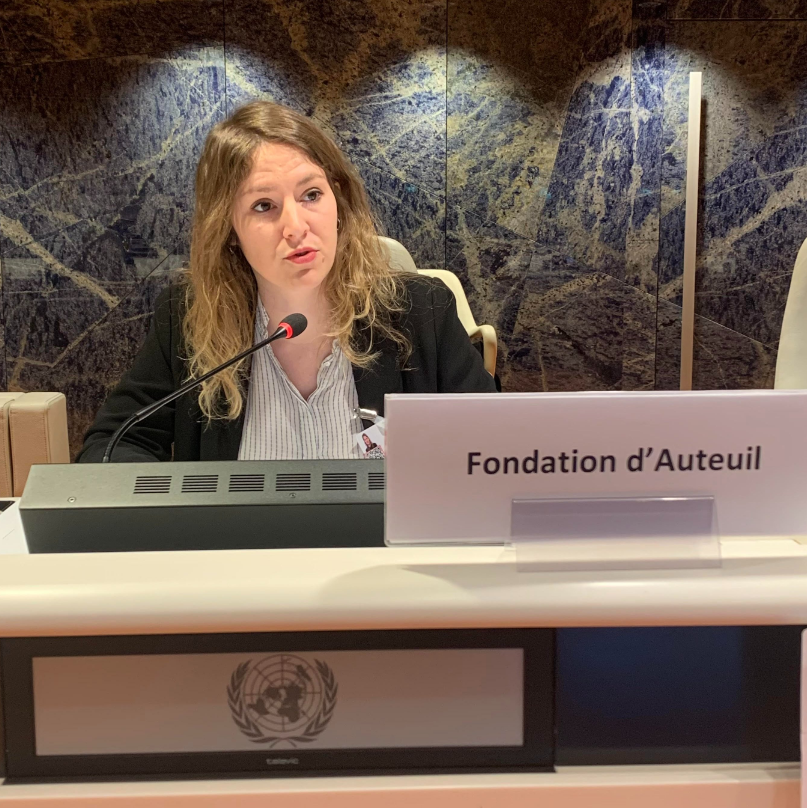

Children's rights were in the spotlight during the Universal Periodic Review (UPR) of France! Apprentis d'Auteuil and the Apprentis d'Auteuil International Foundation presented a report on the state of children's rights in France. This is the second time we have participated in this process which allows the UN Human Rights Council to examine the human rights situation in France.
Last April, we took part in the pre-sessions during which civil society can present its alternative reports, make use of its field experience and propose appropriate responses.

Virginie Hoarau, Apprentis d'Auteuil Advocacy Officer in France, presented our recommendations to the different delegations of the Member States.
"To convince the representatives of the States to take up our recommendations during the French review, we knew the rules of the game: a five-minute statement on the podium. And then the advocacy happens in the corridors!
This time in the gallery was an essential step in making the foundation visible. And it is an opportunity because it is not offered to all organisations.”
Virginie Hoarau, Advocacy Officer, Apprentis d'Auteuil
24 recommandations reprenant nos préoccupations ont été adressées à l’Etat français !
Trois thématiques principales ont été adressées dans le rapport que nous avons présenté. Premièrement, la lutte contre le déterminisme social et la reproduction des inégalités. Deuxièmement, le besoin de protéger les enfants des violences et garantir leur sécurité. Troisièmement, la question de l’accès à l’éducation de qualité pour tous les enfants sur l’ensemble du territoire français.
Lundi dernier, 1er mai 2023 a eu lieu l’EPU de la France. Pour l’occasion, une délégation du gouvernement français représenté par Mme la Ministre Isabelle Lonvis-Rome, Ministre en charge de l'Égalité entre les femmes et les hommes, de la Diversité et de l'Égalité des chances s’est rendue à Genève pour présenter les avancées du pays et a reçu les nombreuses recommandations présentées par les Etats membres pour améliorer la mise en œuvre des droits humains.
Il appartient désormais à l’Etat français d’accepter officiellement ces recommandations devant le Conseil des droits de l’Homme dans les prochains mois. Nous sommes confiants que l’Etat s’engagera à les mettre en œuvre et nous nous engageons à suivre leurs implémentations d’ici le prochain périodique Universel, dans 5 ans.
The recommendations
- Pursue implementation of policies to grant access to social rights and services for youth (Moldavia)
- Strengthen efforts to reduce the impact of social inequalities (Moldavia)
- To take additional measures to combat discrimination in the field of education by guaranteeing access to all levels of education to vulnerable groups, including persons with disabilities (Somalia)
- Support the schooling of children in vulnerable situations, particularly those living in social housing and asylum seekers living in emergency centres (Spain)
- To ensure the right to quality education for all children (Sri Lanka)
- To continue its efforts to promote inclusive education and to combat all forms of violence in schools and education (State of Palestine)
- To introduce mechanisms to improve education outcomes in its overseas territories in line with national education priorities (Australia)
- To pursue its efforts to reduce the economic gap between the overseas territories and the mainland (Bahamas)
- To look at discrimination in access to education (Bahrain)
- Ensure social access to all vulnerable segments of the population including those living in poverty and homelessness, as well as medical service and school education (Bahrain)
- Undertake an exact stocktake exercise on the state of schooling of children out of school all from disadvantaged backgrounds and provide a coordinated response to have adapted solutions (Belgium)
- To pursue efforts to reduce the considerable gaps between mainland France and overseas territories in the area of the enjoyment of human rights (Benin)
- To step up efforts to promote inclusive education and take measures to combat any violence in any school establishment whatever the level (Ivory Coast)
- Establish a mechanism to monitor violence in juvenile institutions and strengthen the training of professionals in detecting and responding to it at the earliest stage (Croatia)
- Adopt measures to fight all forms of violence at all levels of education in schools (Dominican Republic)
- To give effective protection to unaccompanied migrants who are minors and make sure that they can attend schools (Ecuador)
- Implement measures guaranteeing equal access to education for all children including for those of migrants and asylum seekers (Gambia)
- Ensure the protection of unaccompanied minors and provide them with proper living conditions and quality education (Germany)
- Take effective measures to further reduce disparities in access to schooling particularly for persons belonging to vulnerable groups (Japan)
- Guarantee the right to quality education for all children, unaccompanied migrants, residents of overseas territories, and indigenous children bearing in mind the particular and unique needs as well as cultural and linguistic diversity (Mexico)
- Continue efforts for an inclusive education guided by SDG n 4 (Morocco)
- To continue its efforts to promote inclusive education and to adopt measures to ensure equality and non-discrimination to quality education for all children (North Macedonia)
- All up France to take measures to take particular steps to ensure high-quality education to children in overseas territories (Philippines)
- To establish an observatory on unschooling (Portugal)
Three main themes were addressed in the report we presented. Firstly, the fight against social determinism and the reproduction of inequalities. Secondly, the need to protect children from violence and ensure their safety. Thirdly, the issue of access to quality education for all children throughout France.
Last Monday, 1 May 2023, the UPR of France took place. For the occasion, a delegation of the French government represented by Mrs. Isabelle Lonvis-Rome, Minister in charge of Equality between women and men, Diversity and Equal Opportunities went to Geneva to present the progress of the country and received the numerous recommendations presented by the Member States to improve the implementation of human rights.
24 recommendations reflecting our concerns were addressed to the French State!
It is now up to the French State to officially accept these recommendations before the Human Rights Council in the coming months. We are confident that the State will commit their implementation and we will monitor their progress between now and the next Universal Periodic Review, in 5 years.